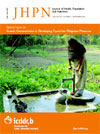
|
The Journal of Health, Population and Nutrition
icddr,b
ISSN: 1606-0997
EISSN: 1606-0997
Vol. 26, No. 2, 2008, pp. 241-250
|
 Bioline Code: hn08026
Bioline Code: hn08026
Full paper language: English
Document type: Research Article
Document available free of charge
|
|
|
The Journal of Health, Population and Nutrition, Vol. 26, No. 2, 2008, pp. 241-250
| en |
Social and Logistical Barriers to the Use of Reversible Contraception among Women in a Rural Indian Village
Hall, Mary Ann Kirkconnell; Stephenson, Rob B. & Juvekar, Sanjay
Abstract
Women in a small coastal village in western India were asked to explain their preference for female sterilization over modern reversible contraceptive methods. Married women aged 19+ years were interviewed in six focus groups (n=60) and individually (n=15) regarding contraceptive methods and their use and side-effects. Women publicly denied contraceptive use but privately acknowledged limited use. They obtained contraceptive information from other village women and believed that modern reversible methods and vasectomy have high physical and social risks, and fertility goals could be achieved without their use. Women felt that reversible contraception is undesirable, socially unacceptable, and usually unnecessary, although the achievement of fertility goals is likely due to the use of female sterilization with abortion as a back-up method. Economic migration of village men may also play a role. Although women with high social capital can effectively disseminate correct knowledge, the impact on the uptake of reversible method is uncertain.
Keywords
Beliefs; Contraception; Contraception, Reversible; Contraceptive methods; Family planning; Women; India
|
| |
© Copyright 2008 - International Centre For Diarrhoeal Disease Research, Bangladesh
Alternative site location: http://www.jhpn.net
|
|
